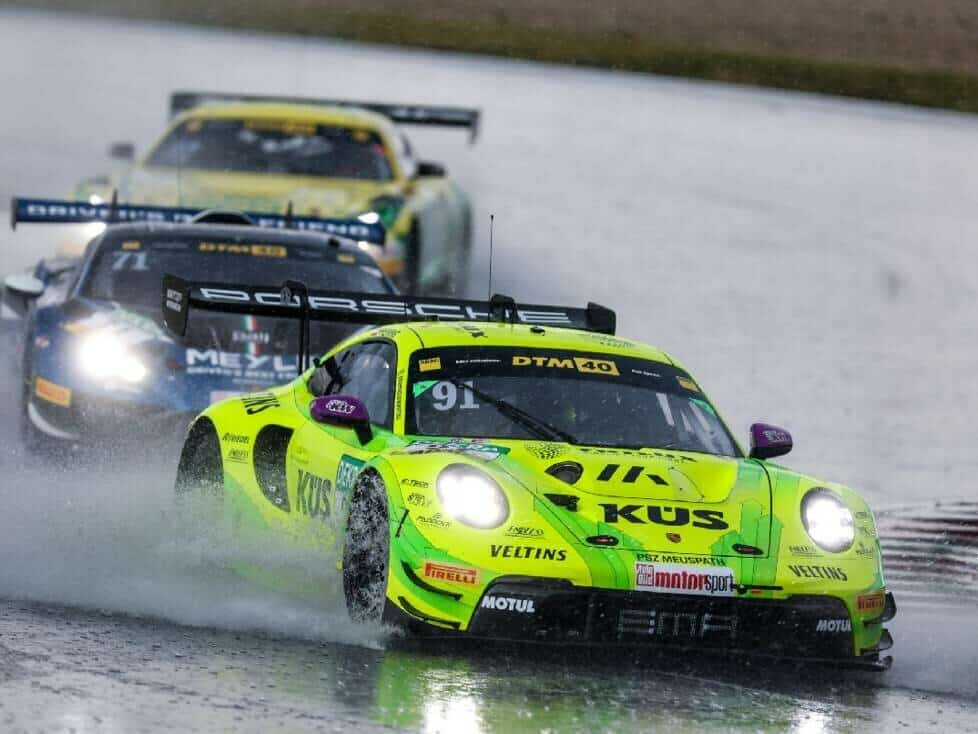The flooded track at the DTM Lausitzring was not an isolated incident: Why there were repeated problems and how operator Dekra responded to the criticism
After the monsoon rain at Saturday’s DTM race at the Lausitzring, which had to be interrupted twice, there was criticism in the paddock that the track was not suitable for such conditions. And there was also displeasure in the DTM paddock about the track. “When it rains, the Lausitzring is not necessarily a safe track,”
“Even with minimal rain, you actually have to stop a race here because there are such large puddles and puddles of paint in the depressions that every race car floats. On another track, I don’t think we would have needed two restarts.”
The condition of the track also leaves a lot to be desired. “Unfortunately, the track is getting worse and worse because the area here is obviously moving quite a bit. The bumps are not getting any better as a result,” says the Austrian.
Is rain poison for the Lausitzring? “We’ve known that for 15 or 20 years “
By saying this, Grasser has addressed part of the problem. Because where the circuit originally built for the Champ Car series stands today, brown coal was mined in the Meuro open-cast mine from 1958 to 1999. This caused the notorious bumps. “You get back pain on Sunday evenings because it’s so bumpy,” says Grasser driver Luca Engstler.
Is the track no longer up to date? “I couldn’t say that right now,” says Grasser. “It’s mainly the problem in the rain that I’m critical of.” On a dry track, we have seen “exciting races”, he does not just want to paint a bleak picture.
But is it really true that the Lausitzring is worse equipped to cope with masses of water than other circuits? “You’re already in a cauldron here,” Abt sports director Martin Tomczyk points out. “And the water has to go somewhere.” And HRT team boss Ulrich Fritz, who also knows the circuit well from his time as head of DTM at Mercedes, adds: “We’ve known for 15 or 20 years that the water doesn’t drain properly here. “
DTM premiere was canceled in 2000: “That was madness “
In 2000, there was “a huge thunderstorm” at the DTM at the Lausitzring. “That got completely out of hand. Nothing drained away back then, but nothing at all.” In fact, the DTM premiere at the Lausitzring had to be canceled because the race organizers could not justify starting the race for safety reasons.
“At the time, it felt like the water in the infield was 20 centimetres high,” recalls Thomas Jäger, who was in the Mercedes cockpit at the time and is now Head of Sporting DTM at the brand with the three-pointed star. “You had spinning wheels in third gear. It was undriveable. That was madness. “
Not only teams and manufacturers are aware of the problem, but also the ADAC. “The race track hasn’t just been open since yesterday, but it has always had problems getting rid of the water in rain and heavy rain,” says ADAC Head of Motorsport Thomas Voss. “This has nothing to do with the race track operator, but a lot to do with the surface,” he says, defending the operator Dekra, who took over the track at the end of 2017.
In the past, the fire department had to pump out water in the infield
In addition, the original asphalt was created for the Champ Car series, which does not race in the rain anyway, and is less permeable to water than other surfaces. In addition, there was a major drainage problem, especially in the early days of the track: eyewitnesses remember that the fire department sometimes had to be called out to pump out the water in the infield.
“The track operators have improved this,” says Tomczyk. In fact, work was carried out on the drainage over ten years ago – before Dekra took over – to prevent such conditions
This is what Lausitzring operator Dekra says about the problems
“It was unfortunate circumstances,” says a spokesman about the two interruptions due to rain last DTM weekend. “So many liters of rain per square meter are a challenge for any race track. Similar situations occur again and again and at most circuits. This is not a special Lausitzring issue.” Apart from that, the facility “copes very well with medium rain.”
The fact that the water in the paddock does not drain away and lakes have formed in front of the pits, much to the annoyance of some teams, is partly due to the fact that additional paddock areas were asphalted and sealed for the Red Bull Air Race a few years ago.
“Almost 70,000 square meters of surface have to be drained,” says the Dekra spokesperson. “At around ten liters per square meter within 20 minutes, anyone can work out what that means. We were amazed at how positive the situation was just 40 minutes after the rain. “

